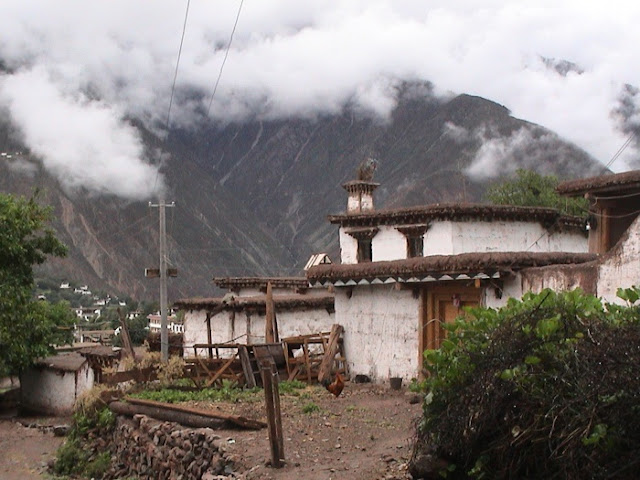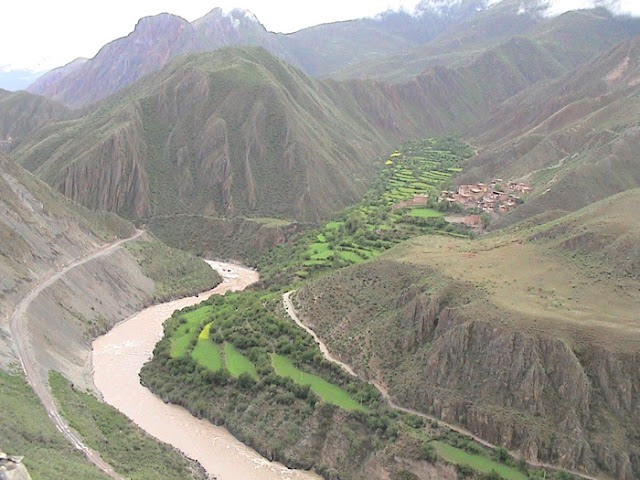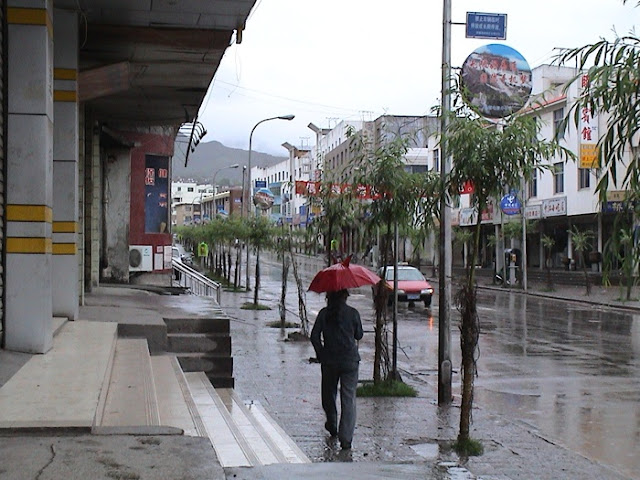Tibet. When people hear this word, various images come to mind. For some it’s the Dalai Lama’s laughter and humility, or the political turmoil that occasionally rears its head in the international news. For others, it is the towering Himalayas, which not only provide the headwaters for numerous major rivers—the Yangtze, Mekong, and Brahmaputra, for instance—but also explain why Tibetans tend to have rosy read cheeks and deep wrinkles as they age: their skin is exposed to a much greater concentration of UV rays than the skin of people who live at lower elevations (which is almost the entire rest of the world).

Yanjing, where I spent my first two days in Tibet
But when I hear the word “Tibet”, I’ll sometimes think of something that you probably don’t: a glorious hot water tap in a rundown boarding house in Chamdo.
The story begins at the Tibet-Yunnan border. Both of these provinces are a part of China, but while one can travel solo across Yunnan, one cannot, according to Chinese law, travel solo across Tibet. The law requires that you have a guide and be part of a tour. And so this story—which will culminate with me standing under the hot water tap in four days—rightfully begins at the border.
I crossed the border with every intention of traversing the eastern half of Tibet on my own—which is to say, I crossed the border with some degree of nausea. (This, by the way, is how you know you’re embarking on an adventure: you just might vomit if you think too long of all that could go wrong.)
The first town I came to was only a mile or two across the border. Here I was stuck for two days on account of bus drivers who refused to risk carrying an illegal foreigner (day one) and a landslide that blocked the road ahead (day two). It was an interminably long two days.

A village not far from Chamdo
On the third day, led by a very chummy bus driver and joined by a score of Tibetans and four young Chinese tourists from Shanghai and Beijing, I traveled hours down the road with no problem (at the police checkpoints, the driver instructed me to duck in my seat, which had the desired effect of hiding myself). I was surprised that the four Chinese tourists had no idea that foreigners couldn’t travel across Tibet alone. Even more, I was thrilled that they thought the law archaic, offering their help (which would mostly take the form of translation assistance) so that I might succeed in my quest.
At the end of this first day on the road we spent the night in a boarding house where there were no police and nobody cared about the law pertaining to foreigners. This was nice.
The next day, after another long day of travel, the bus arrived in the town of Chamdo. It wasn’t long before my Chinese friends, after talking with some locals, gingerly informed me that I was in danger of being caught here—just days earlier two foreigners had been caught right here at the bus station and sent out of Tibet. It would be best to find a place to stay as quickly as possible and then stay indoors.

Chamdo is the largest city in eastern Tibet. This one photo is all I took of the town.
I will need to skip through many details at this point, but here’s what is important: I had never in all my travels felt so far from home. I was out of email contact, few people had any idea where I was, and as I sat in my room every creak of the door left me tense, wondering if it was the police coming to expel me. On top of this, I hadn’t been able to bathe in four days.
And so when the manager of the boarding house, an old woman who had probably seen nervous travelers like me before, knocked on my door to show me where I could bathe, I followed her to a dingy room where a flimsy pipe poked out of a wall.
Now alone in the room, I turned the knob. Water emerged from the pipe with some force and to my surprise it wasn’t cold. It was almost even too hot. I crawled under its flow and felt its heat. It was the most cathartic thing I had experienced in days, not because it was cleaning me but because it was comforting me. This was as close as I had come to being embraced by a human in weeks. And when you’re on a nerve-wracking adventure, sometimes all you want at the end of a day is a warm body beside you, an embrace.
But in lieu of the warm body, a hot shower can do wonders. It can even be like an encouraging friend. In any case, I suspect it was the shower that led me to sleep soundly this night.
Joel Carillet, chief editor of wanderingeducators.com, is a freelance writer and photographer based in Tennessee. He is the author of 30 Reasons to Travel: Photographs and Reflections from Southeast Asia. To learn more about him, visit www.joelcarillet.com.
